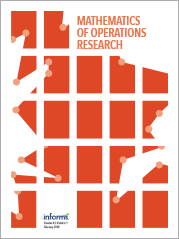Uniqueness of Clearing Payment Matrices in Financial Networks
Abstract
We study bankruptcy problems in financial networks in the presence of general bankruptcy laws. The set of clearing payment matrices is shown to be a lattice, which guarantees the existence of a greatest clearing payment and a least clearing payment. Multiplicity of clearing payment matrices is both a theoretical and a practical concern. We present a new condition for uniqueness that generalizes all the existing conditions proposed in the literature. Our condition depends on the decomposition of the financial network into strongly connected components. A strongly connected component that contains more than one agent is called a cycle, and the involved agents are called cyclical agents. If there is a cycle without successors, then one of the agents in such a cycle should have a strictly positive endowment. The division rule used by a cyclical agent with a strictly positive endowment should be positive monotonic, and the rule used by a cyclical agent with a zero endowment should be strictly monotonic. Because division rules involving priorities are not positive monotonic, uniqueness of the clearing payment matrix is a much bigger concern for such division rules than for proportional ones. As a final contribution of the paper, we exhibit the relationship between the uniqueness of clearing payment matrices and the continuity of bankruptcy rules, a property that is very much desired for stability of financial systems.
Funding: This research was supported by the Higher Education Institutional Excellence Program 2020 of the Ministry of Innovation and Technology in the framework of the “Financial and Public Services” research project [Grant TKP2020-IKA-02] at Corvinus University of Budapest. P. Csóka received funding from the National Research, Development and Innovation Office [Grants K-120035 and K-138826].



